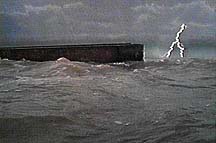
Where did "Easter" get its name? Where did the concept of an Easter egg and bunny originate?
The name "Easter" has its roots in ancient polytheistic religions (paganism). On this, all scholars agree. This name is never used in the original Scriptures, nor is it ever associated biblically with the death and resurrection of Jesus Christ. For these reasons, we prefer to use the term "Resurrection Sunday" rather than "Easter" when referring to the annual Christian remembrance of Christ's resurrection.
Ancient origin
Most reference books say that the name "Easter" derived from the Eastre, the Teutonic goddess of Spring. Although this relationship exists, in reality, the origin of the name and the goddess are far more ancient - going all the way back to the Tower of Babel. The origin begins not long after the biblical Flood.

The Flood was a divine judgment sent on mankind after evil had become all pervasive and all people everywhere were totally unresponsive to God. The Bible says that "the wickedness of man was great in the earth, and that every intent of the thoughts of his heart was only evil continually" (Genesis 6:5, NKJV). It is not difficult to imagine that life must have been almost unbearable at this time in history. God gave humankind a second chance by preserving the righteous man Noah and his family (a total of 8 people).
After the Flood, Noah had a talented, but evil, great-grandson named Nimrod (Genesis 10:6-10) who rebelled greatly against God. The Bible says that he was "a mighty one"<1> Jewish tradition indicates that Nimrod was a tyrant "who made all of the people rebellious against God."<2> It is evident from history that Nimrod was not only a political leader, but also the lead priest of a form of occultic worship.<3>
snip
http://www.christiananswers.net/q-eden/edn-t020.htmlPosted: 2004-04-07 23:00
"The Passion of the Bunny" ??
GLASSPORT, Pa. -- A church that put on
an Easter show said it was trying to
teach about Jesus Christ.
But the people who saw the show say
they were upset by performers who
broke eggs and pretended to whip
the Easter bunny.
People who attended Saturday's performance of an Easter celebration at a memorial stadium in Glassport, Allegheny County, quoted performers as saying "There is no Easter bunny."
Melissa Salzmann said the program was inappropriate for young children. She said her son cried and asked why the bunny was
(being) whipped.
snip
http://smirkingchimp.com/viewtopic.php?topic=38804&forum=14Web Results 1 - 10 of about 75,300 for "resurrection sunday". (0.27 seconds)
Sponsored Links
Custom Easter Banners
Custom & Stock Easter Banners
24 hour turn around
www.amplifydesigns.com
Tip: Save time by hitting the return key instead of clicking on "search"
Annie's Resurrection Sunday PageOne of the BEST ways to celebrate "Resurrection Sunday" is to start it with a Sunrise Service ... Don't forget to say Happy Resurrection Sunday this year! ...
www.annieshomepage.com/resurrectionsunday.html - 20k - Cached - Similar pages
What is the origin of Easter? - ChristianAnswers.NetFor these reasons, we prefer to use the term "Resurrection Sunday" rather than "Easter" ... How is the date for Easter (Resurrection Sunday) determined? ...
www.christiananswers.net/q-eden/edn-t020.html - 23k - Cached - Similar pages
The Resurrection of Jesus Christ ("Easter") - ChristianAnswers.NetHow is the date for Resurrection Sunday determined? Answer ... Mormonisn - What is the significance of Resurrection Sunday for Mormons? Answer ...
www.christiananswers.net/easter.html - 22k - Cached - Similar pages
< More results from www.christiananswers.net >
Resurrection Sunday?The practice of renaming Easter as "Resurrection Sunday" seems to ... Hence, the similarity to Easter or "Resurrection Sunday" fails on this count as well. ...
www.planetkc.com/puritan/ Articles/ResurrectionSunday_f.htm - 39k - Cached - Similar pages
The Easter SeasonEaster or Resurrection Sunday is the day Christians celebrate the resurrection of Jesus the Christ from the dead. Even before theologians explained the ...
www.cresourcei.org/cyeaster.html - 31k - Apr 12, 2006 - Cached - Similar pages
Resurrection SundayResurrection Sunday - What is the significance of this celebrated Easter holiday? Why is it important to Christianity and those who believe in Jesus?
www.allaboutjesuschrist.org/resurrection-sunday-faq.htm - 11k - Cached - Similar pages
Easter and the fifty day Resurrection seasonIf death is our just and 'natural' end, then what is Resurrection Sunday about? Simply this : the One who made it all loves us so much that losing us is a ...
www.spirithome.com/resurrex.html - 14k - Cached - Similar pages
Welcome to Living Rock Ministries Resurection SundayResurrection Sunday- not Easter! Living in a small community my husband and I received several mass mailing postcards from local churches asking us to ...
www.livingrockministries.com/righteousness2003RS.htm - 12k - Cached - Similar pages
Resurrection Sunday Art Prints - Artwork Celebrating Palm Sunday ...Resurrection Sunday art prints celebrating Palm Sunday can be purchased at great savings at Christ-Centered Art.
www.christcenteredmall.com/ stores/art/resurrection_sunday.htm - 27k - Cached - Similar pages
"Testament of Jesus" in His Resurrection, Sunday: The Lord's Day"Testament of Jesus" in His Resurrection, Sunday: The Lord's Day.
biblia.com/jesusbible/passion16.htm - 21k - Cached - Similar pages
http://www.google.com/search?hl=en&lr=&q=%22resurrection+sunday%22&btnG=Search